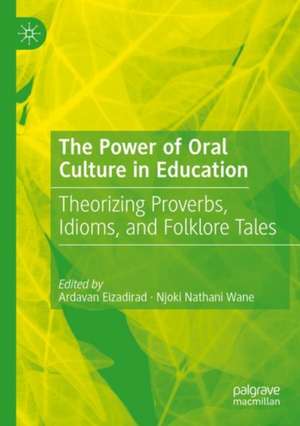The Power of Oral Culture in Education: Theorizing Proverbs, Idioms, and Folklore Tales
Editat de Ardavan Eizadirad, Njoki Nathani Waneen Limba Engleză Paperback – 5 mar 2024
This volume explores the importance of inter-generational oral culture and stories that transcend time, space, and boundaries transmitted historically from one generation to the next through proverbs, idioms, and folklore tales in different geographical and spatial contexts. These important stories and their embedded life lessons are introduced, explained, and supplemented with pre and post educational activities and lesson plans to be used as learning resources. The centering of orality as a tool and medium for educating the future generation is a reclamation and reaffirmation of Indigeneity, Indigenous knowledges. and non-hegemonic approaches to support students in a socio-culturally sustaining manner. Through this understanding, this book explores the interconnectedness between culture, traditions, language, and way of life through oral storytelling, sharing, and listening.
| Toate formatele și edițiile | Preț | Express |
|---|---|---|
| Paperback (1) | 798.85 lei 38-45 zile | |
| Springer International Publishing – 5 mar 2024 | 798.85 lei 38-45 zile | |
| Hardback (1) | 894.34 lei 6-8 săpt. | |
| Springer International Publishing – 4 mar 2023 | 894.34 lei 6-8 săpt. |
Preț: 798.85 lei
Preț vechi: 877.86 lei
-9% Nou
Puncte Express: 1198
Preț estimativ în valută:
152.86€ • 159.60$ • 126.51£
152.86€ • 159.60$ • 126.51£
Carte tipărită la comandă
Livrare economică 31 martie-07 aprilie
Preluare comenzi: 021 569.72.76
Specificații
ISBN-13: 9783031185397
ISBN-10: 3031185390
Pagini: 305
Ilustrații: XXII, 305 p. 2 illus.
Dimensiuni: 148 x 210 mm
Greutate: 0.42 kg
Ediția:2023
Editura: Springer International Publishing
Colecția Palgrave Macmillan
Locul publicării:Cham, Switzerland
ISBN-10: 3031185390
Pagini: 305
Ilustrații: XXII, 305 p. 2 illus.
Dimensiuni: 148 x 210 mm
Greutate: 0.42 kg
Ediția:2023
Editura: Springer International Publishing
Colecția Palgrave Macmillan
Locul publicării:Cham, Switzerland
Cuprins
Chapter 1: Introduction: Power of Oral Culture as Spiritual Intergenerational Dialogue.- Chapter 2: "If a Child is not Initiated into a Village, They Will Burn it Down Just to Feel its Warmth”.- Chapter 3: “mtu akikuita mmbwa usibweke/When Someone Calls You a Dog, Don’t Bark Back”.- Chapter 4: Blind Men and the Elephant.- Chapter 5: African Indigenous Culture: Ancestors as Foundations of Who We Are and Who We are to Become.- Chapter 6: The ‘Listening Heart’: Rumi’s Story of the Parrot and the Merchant.- Chapter 7: Comic Telling through Rakugo Storytelling: The Persimmon Tree.- Chapter 8: Seizing an Afrocentric Identity Within a U.S Context: Reclaiming the Self Through Resistance.- Chapter 9: The Hyphenated Identity: Iranian- Canadian.- Chapter 10: Strength through Resistance: Malalai of Maiwand.- Chapter 11: Buraanbur Healing Approach to Prevent Mental Illness among Somali Women living in Mainstream Spaces.- Chapter 12: Re-Membering a Goan Folktale in the Midst of a Global Pandemic.- Chapter 13: Legend of the No Face Doll (origin: Haudenosaunee).- Chapter 14: The Role of Oral Traditions in Sustaining Black Owned Enterprises.- Chapter 15: The Legend of Tapkendi – The Kalenjin lady who outsmarted Maasai Warriors.- Chapter 16: African Grandmothers’ Teachings: The Power of Orality.
Notă biografică
Ardavan Eizadirad is Assistant Professor in the Faculty of Education at Wilfrid Laurier University, Canada. His research interests include equity, standardized testing, youth violence, community engagement, anti-oppressive practices, critical pedagogy, social justice education, resistance, and decolonization.
Njoki Nathani Wane is Chair of the Department of Social Justice Education at the Ontario Institute for Studies in Education (OISE) at the University of Toronto, Canada. Wane’s research interests include African Indigenous knowledges, spirituality, anti-colonial, decolonial, and decolonization theory.
Textul de pe ultima copertă
This volume explores the importance of inter-generational oral culture and stories that transcend time, space, and boundaries transmitted historically from one generation to the next through proverbs, idioms, and folklore tales in different geographical and spatial contexts. These important stories and their embedded life lessons are introduced, explained, and supplemented with pre and post educational activities and lesson plans to be used as learning resources. The centering of orality as a tool and medium for educating the future generation is a reclamation and reaffirmation of Indigeneity, Indigenous knowledges. and non-hegemonic approaches to support students in a socio-culturally sustaining manner. Through this understanding, this book explores the interconnectedness between culture, traditions, language, and way of life through oral storytelling, sharing, and listening.
Caracteristici
Explores the power of oral culture centering Indigeneity and non-hegemonic approaches in education Features a range of contributors from equity-deserving identities representing oral culture from different identities, communities, and countries Includes pedagogical tools for educators, practitioners, and students
